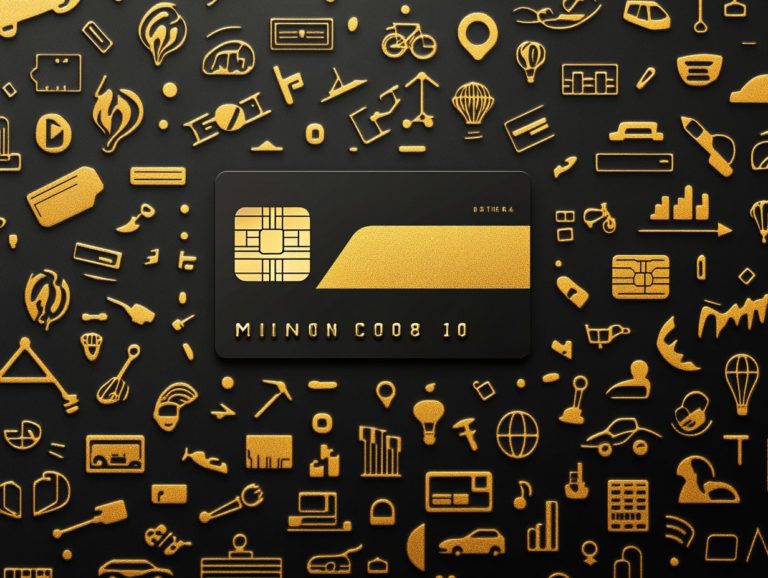How to Rebuild Your Credit with a Credit Card
Knowing your credit score can unlock your financial future! Understanding your credit score is essential for attaining financial stability and making well-informed decisions.
This article delves into what a credit score is and why it holds significant importance in your financial journey. It provides a comprehensive guide to rebuilding your credit using a credit card, complete with tips on selecting the right card and utilizing it responsibly.
You will uncover key strategies for enhancing your score, recognize common pitfalls to steer clear of, and learn how to manage credit card debt effectively.
Unlock the secrets to a more prosperous financial future!
Contents
- Key Takeaways:
- Understanding Your Credit Score
- Rebuilding Your Credit with a Credit Card
- Tips for Improving Your Credit Score
- Common Mistakes to Avoid
- Frequently Asked Questions
- Why should I focus on rebuilding my credit with a credit card?
- How do I choose the right credit card to rebuild my credit?
- Should I pay off my balance in full or make minimum payments to rebuild my credit?
- What are some tips for using a credit card to rebuild credit?
- Can using a credit card to rebuild credit hurt my credit score?
- What are some alternative ways to rebuild credit besides using a credit card?
Key Takeaways:

- Building a good credit score is crucial for financial stability and future opportunities.
- Choose a credit card wisely and use it responsibly to rebuild your credit.
- Paying bills on time and managing finances effectively are key factors in improving your credit score.
Understanding Your Credit Score
Understanding your credit score is crucial for maintaining your financial health. It directly impacts your ability to secure loans, credit cards, and even rental applications.
Your credit score reflects your ability to handle credit. It is shaped by factors like payment history, credit utilization, and the variety of credit accounts you manage.
What is a Credit Score and Why is it Important?
A credit score serves as a numerical snapshot of your creditworthiness. It is shaped primarily by your financial habits, such as timely payments and overall credit utilization.
This score holds significant weight in the financial realm. It impacts your ability to secure loans, mortgages, and credit cards.
Lenders frequently rely on this score to gauge risk. It helps them decide not only whether to approve your application but also what interest rates they ll extend.
The most prevalent scoring models are FICO and VantageScore. Each employs distinct methodologies and factors for calculating scores. While FICO has long been the gold standard, VantageScore has been gaining momentum, especially for its capacity to evaluate credit profiles that might lack extensive historical data.
Grasping these scoring systems is crucial for anyone aiming to navigate the credit landscape with confidence.
Rebuilding Your Credit with a Credit Card
Rebuilding your credit through the strategic use of a credit card can be a game-changer for your credit scores over time. By responsibly utilizing a secured card or becoming an authorized user on someone else’s account, you can learn how to use secured credit cards to build credit and enhance your credit history. Establishing a positive payment record is crucial for your overall creditworthiness.
It s imperative to manage these credit accounts with care. They significantly influence your credit limit and, in turn, your ability to secure loans and other financial products.
Choosing the Right Credit Card

Choosing the right credit card is essential for effectively managing your finances, as it can significantly influence the role of credit cards in building credit history or rebuilding your credit history.
In today s dynamic financial landscape, you have a plethora of options beyond just the standard cards. For instance, secured cards can be a valuable tool if you’re looking to improve your credit score; they require a cash deposit that acts as collateral, giving you a solid foundation to work from.
Student credit cards cater specifically to young adults stepping into the financial realm. These cards often come with lower credit limits and educational resources designed to promote responsible usage.
It s crucial to explore various credit card issuers, as they each offer unique perks think cashback rewards, travel points, or enticing low introductory APRs. When selecting a card, take the time to understand annual fees, interest rates, and additional benefits. This can profoundly impact your overall financial journey.
Don t wait to improve your score act now to choose the right card!
Using Your Credit Card Responsibly
Using your credit card responsibly is crucial for a healthy credit score and avoiding debt traps that can threaten your financial future.
By using effective strategies, you can ensure your credit usage positively impacts your financial health.
Keep your credit utilization the amount of credit you use below 30%. This shows lenders that you manage credit wisely.
Making timely payments helps you avoid late fees and builds a strong payment history, which is vital for your credit score.
Choose cards with low-interest rates to prevent overwhelming debt.
Cultivating these habits will improve your financial credibility and open doors to better financing options in the future.
Tips for Improving Your Credit Score
Improving your credit score involves a series of strategic steps aimed at refining your financial habits.
Monitor your credit reports and practice responsible financial behaviors. This will help elevate your credit scores over time.
Understanding your credit activities simplifies loan applications and can lead to lower interest rates on future accounts.
Payment History and Credit Utilization
Payment history and credit utilization are critical factors that influence your credit scores.
A solid record of on-time payments shows lenders you are reliable, positively affecting your credit score.
In contrast, missed payments lead to penalties and can hurt your score for years. Keep your credit utilization low it reflects your financial responsibility.
To manage your credit utilization effectively, implement these strategies:
- Pay off existing balances before the due date.
- Avoid accumulating new debt.
- Review your credit reports regularly to track changes and identify areas for improvement.
Managing Your Finances Effectively

Managing your finances effectively is crucial for a strong credit profile.
Use budgeting techniques to understand your spending habits and allocate your funds wisely. For instance, the 50/30/20 rule suggests spending 50% of your income on needs, 30% on wants, and saving 20% for savings and debt repayment.
Implement debt management strategies like the snowball or avalanche method to reduce balances. Set up automatic payments or reminders to avoid late fees that can damage your credit score.
By focusing on these practices, you ll better control your personal finances and achieve your long-term financial goals.
Common Mistakes to Avoid
Being aware of common pitfalls can help you protect your credit scores and overall financial well-being.
Avoid accumulating unnecessary credit inquiries, missing payment deadlines, and exceeding your credit limits.
These mistakes can lead to higher interest charges and a lower sense of creditworthiness. Recognize these challenges to refine your credit behavior and build a positive credit history.
Credit Card Traps to Watch Out For
Understanding credit card traps is crucial for maintaining a healthy credit profile and avoiding unnecessary debt. Many people tend to overlook these pitfalls, which can lead to unexpected surprises in their monthly statements.
Hidden fees can sneak in through annual charges or late payment penalties, significantly inflating the total cost of credit. High-interest rates can compound rapidly, making it challenging to pay off balances and potentially trapping you in a cycle of debt.
Excessive credit inquiries can also hurt your credit score, hindering your future borrowing opportunities.
To navigate these common traps successfully, it s essential for you to read the fine print, compare offers, and manage your payments diligently. This approach will ensure you have a better credit experience.
How to Handle Credit Card Debt
Effectively managing credit card debt requires a smart plan for repayment and financial responsibility.
Dealing with credit card debt can be tough. Adopting methods like the snowball and avalanche strategies can guide you toward becoming debt-free.
The snowball method prioritizes paying off your smaller debts first, offering a quick sense of accomplishment that can motivate you to tackle those larger balances. On the other hand, the avalanche method focuses on settling debts with the highest interest rates first, ultimately saving you money on interest payments over time.
Making timely payments is crucial. This practice helps you avoid additional fees and maintain a positive credit score, making it easier for you to secure favorable loan terms in the future. Don t wait! Start managing your credit card debt today to avoid financial pitfalls.
Frequently Asked Questions

Why should I focus on rebuilding my credit with a credit card?
Rebuilding credit with a credit card can help improve your credit score, making it easier to obtain loans and credit in the future. Following tips for building credit with a credit card can also save you money by qualifying you for lower interest rates.
How do I choose the right credit card to rebuild my credit?
Look for credit cards designed for people with bad or no credit. These cards often have higher interest rates and fees, but they can provide an opportunity to rebuild your credit. Consider exploring the best credit cards for building your score and make sure to compare different cards to choose one that best fits your financial situation.
Should I pay off my balance in full or make minimum payments to rebuild my credit?
It is best to pay off your balance in full each month to avoid interest charges. Making minimum payments can still help improve your credit, but it may take longer to see results.
What are some tips for using a credit card to rebuild credit?
Make small purchases and pay off the balance in full each month. Keep your credit utilization ratio low, which is the amount of credit you use compared to your total available credit, by only using a small percentage of your available credit. Avoid missing payments and make sure to pay on time.
Can using a credit card to rebuild credit hurt my credit score?
As long as you use the credit card responsibly and make payments on time, it should not have a negative impact on your credit score. In fact, it can improve your score over time.
What are some alternative ways to rebuild credit besides using a credit card?
You can also consider using a secured credit card, becoming an authorized user on someone else’s credit card, or taking out a credit builder loan. These options can help you establish a positive credit history and improve your credit score.
Take charge of your financial future start today!






